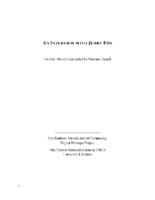Search the Special Collections and Archives Portal
Search Results

Transcript of interview with Elinor Horden by Valerie Fujii, February 13, 1930
Date
Archival Collection
Description
On February 13th, 1980, collector Valerie Fujii interviewed dancer, Elinor Horden, (born May 21st, 1930 in Ohio) at the University of Nevada, Las Vegas. This interview covers local entertainment in the 1950s and the social and environmental changes that have occurred in Las Vegas, Nevada.
Text

Transcript of interview with George Levine by Barbara Tabach, April 16, 2015
Date
Archival Collection
Description
In this interview, George reflects upon his life in Las Vegas, particularly the period as ma?tre d? of the Sand?s Copa Room. Joined by his daughter - and former United States Democratic Congresswomen-Shelley Berkley, George shares stories of working in the gaming industry during this unique era, including those of Frank Sinatra and Wayne Newton. He also talks about his life as a professional gambler.
Born on February 28, 1925 in Sommerville, New Jersey, George Levine?s family moved to his childhood home, Manhattan?s Lower East Side, when he was six months old. George served on a United States Navy aircraft carrier for thirty months during World War II. After returning home, he met his first wife Estelle, with whom he had two daughters, and soon moved to Kiamesha Lake, New York to work at the Concord Resort Hotel. In 1963, George and his family moved to Las Vegas and took his first job at Mr. Sy?s Casino. Six months later he began waiting tables at the Sands Hotel and Casino. He worked his way up the ranks and was ma?tre d' from 1979 until the hotel closed in 1996.
Text

Transcript of interview with Gertrude Rudiak by Claytee White, January 11, 2007
Date
Archival Collection
Description
Gertrude (n?e Rightman) Rudiak was born in 1915 in North Dakota to Russian immigrants. She grew up in Wisconsin until 1924. That was the year the family drove to California via the Yellowstone Trail, a dusty, undeveloped road marked by yellow stones. In Los Angeles, her father practiced chiropractic, a holistic approach to well-being for which there was little knowledge at the time. Gertrude earned her music degree at University of California at Berkeley; a decision that did not lead to a career. She then attended a business college and got a job as a social worker in Northern California. In 1941, she met and soon married George Rudiak. It was the advent of World War II. George enlisted in the service and was assigned to Las Vegas Gunnery School (Nellis Air Force Base.) Since he had a law degree from University of California at Berkeley and passed the Nevada Bar exam, he found supplemental employment with local attorneys. Las Vegas became the Rudiaks? permanent home where they raised their five children. In this interview Gertrude recalls the stories of coming to live in Las Vegas of the 1940?s: their phone number was 1-2-3; the neighborhood they lived in longest being Scotch 80s and being part of the secular and Jewish communities.
Text

Transcript of interview with David Straus and Heidi Straus by Barbara Tabach, November 6, 2015
Date
Archival Collection
Description
In this interview, the Straus? discuss the joys of growing up in Las Vegas during the 1960s and 1970s, and the changes within the community over time, especially in educational opportunities. Both talk about Joyce Straus? career as artist and art educator, and the influence she had on their lives. They also remember Heidi?s father, Jay Sarno, and the impact he had on the local gaming industry. There is also discussion of the founding of Congregation Ner Tamid, the role of Jewish women?s philanthropy within the community, as well as the establishment of The Meadows School.
Text

Transcript of interview with Lori Chenin-Frankl by Barbara Tabach, June 7, 2016
Date
Archival Collection
Description
Lori provides a wonderful narrative of her Judaism, her love of teaching children and her devotion to family and music. She talks about growing up in Las Vegas and becoming a bat mitzvah, a rarity for girls in 1973. Throughout her life, including the period where she moved around with her Air Force husband, she sought Jewish connections to help her feel at home no matter where she was.
Text

Transcript of interview with Jerry Fox by Barbara Tabach, November 12, 2014
Date
Archival Collection
Description
Interview with Jerry Fox by Barbara Tabach on November 12, 2014. In this interview, Fox discusses his father's restaurant, Foxy's Delicatessen, which opened on the Las Vegas Strip in the 1950s, and his own business endeavors including the Tinder Box and an embroidery business.
Jerry Fox grew up in Los Angeles until his family moved to Las Vegas in February 1955, where his father opened Foxy's Delicatessen, the city's first Jewish deli. Jerry would go on to follow in his father's entrepreneurial footsteps, operating several ventures across different industries, including his own restaurant, Foxy Dog. Jerry sold Foxy Dog in 1975 after going through a divorce, the same year that Foxy's Deli closed.
Text

Transcript of interview with Judge Abbi Silver by Barbara Tabach, January 10, 2017
Date
Archival Collection
Description
It is evident that a keen wit and persistent tenaciousness to protect victims of crime have earned Judge Abbi Silver the reputation that elevated her to her current position as Chief Judge of the Nevada Court of Appeals. She is the first female to hold this position. Judge Silver is a lifelong resident of southern Nevada. She was raised in Boulder City, where her family was the only Jewish family at the time. Her father was a doctor and eventually the family moved into Las Vegas, where she graduated from Clark High School and then University of Nevada, Las Vegas (1986). Always an overachiever, she worked multiple jobs?waitress, Utah Jazz cheerleader, dancer?while earning her undergraduate degree and then her law degree from Southwestern University of Law, in Los Angles (1989). In this oral history, Judge Silver recalls being a law clerk for Honorable Earle White, Jr., joining the Clark County District Attorney?s Office and being assigned as the Chief Deputy DA for the Special Victims
Text

Transcript of interview with Bertha Gresh by James M. Green, November 1, 1974
Date
Archival Collection
Description
On November 1, 1974, collector James M. Greene, interviewed widow and mine leaser, Bertha Gresh (born August 29th, 1883, in Cedarburg, Wisconsin) in her home in Nelson, Nevada. This interview covers early mining days, Bertha’s personal history, and the history of Nelson County. She also discusses her art, social activities, and the prizes she won as a visual artist in Nevada.
Text

Transcript of interview with Louis Evans by Jeannettte Lonpergan, February 17, 1976
Date
Archival Collection
Description
On February 17, 1976, Jeannette Lonpergan interviewed well driller and dairy worker, Mr. Louis Evans (born on August 8th, 1914 in Jones County, Iowa) in his home in Las Vegas, Nevada. Mrs. Lonpergan’s husband, Mr. Dennis Lonpergan, was present during the interview and joined in on the discussion. Mr. Louis Evans’ wife, Mrs. Evans, was also present during the interview. Mr. Evans relocated to Nevada from Iowa in search of employment. Construction on the Hoover Dam had begun at this point; Mr. and Mrs. Evans recall their earliest recollections of Nellis Air Force Base and McCarran Airport. The interview covers the history of Nevada from Mr. Evans’ perspective. Mr. Evans discusses the paving of roads, employment, religious activities, housing developments, early above ground atomic tests, social and environmental changes and mining in Nevada.
Text

Transcript of interview with Dale Duane Everett by John Everett, March 7, 1980
Date
Archival Collection
Description
On March 7, 1980, John Everett interviewed his father, cab driver Dale Everett (born January 29, 1924 in Danville, Illinois) at their family home in Las Vegas, Nevada. This interview covers past local historical data. During the interview, Mr. Everett discusses the weather, wildlife, and hunting. He also shares his views on prostitution and gambling in Las Vegas.
Text
